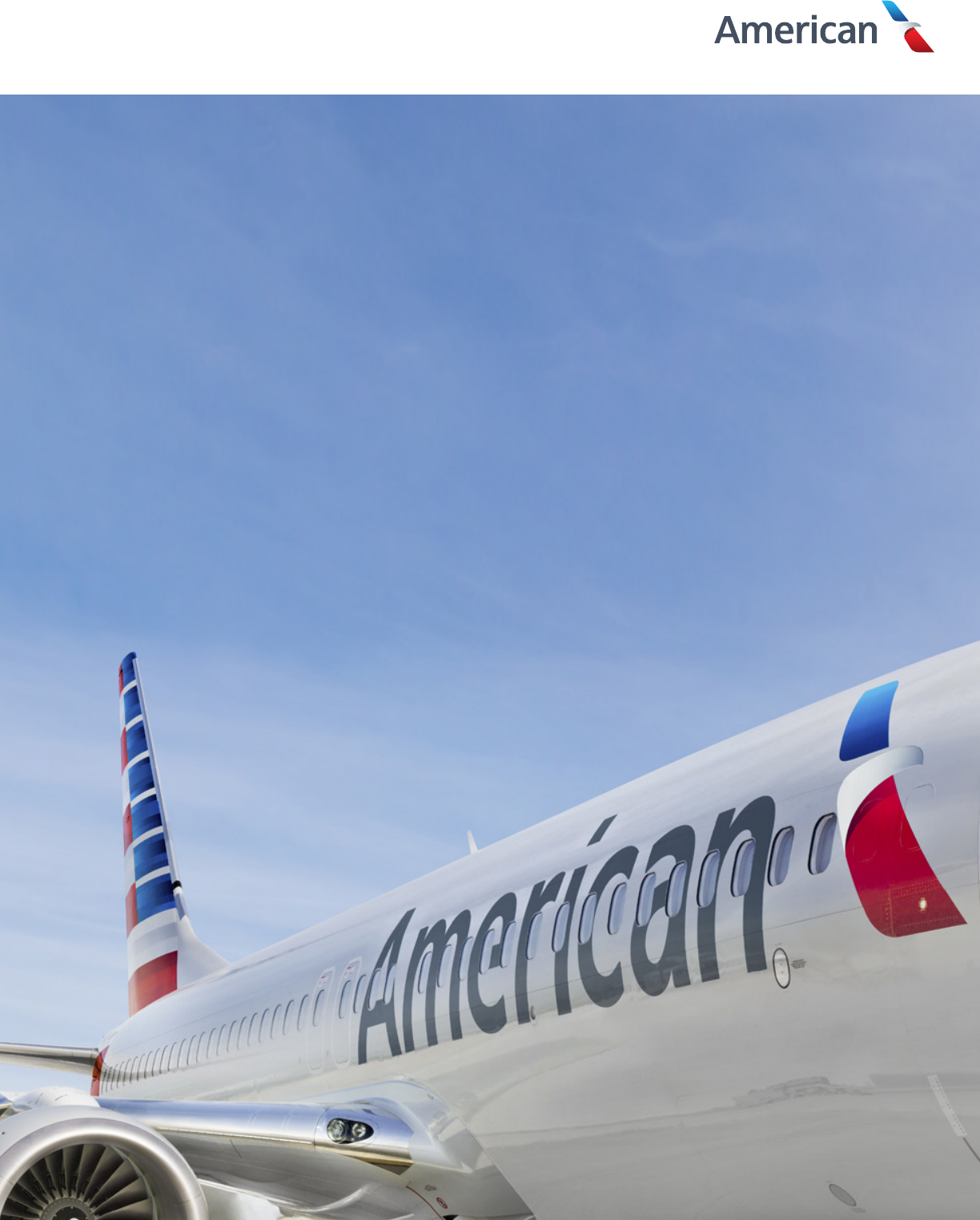
Travel Guide
Jan. 1, 2016

2
|
Travel Guide 2016
Contents
General information ........................1
Employee travel contacts ........................2
Eligibility ..................................................3
Personal travel .............................................5
Baggage, hazardous materials and pets .....................15
Other travel options ...................................... 17
Business travel .................................20
Emergency/bereavement travel .....................21
Travel while absent or on leave of absence (LOA) ............23
Travel standards ..........................................24
Travel tools ...............................................26

1
|
Travel Guide 2016
General information
Overview
As an employee or retiree with travel privileges of
American Airlines Group (“company”) or one of our
wholly owned subsidiaries (Envoy, Piedmont and
PSA), you enjoy some of the best travel privileges in
the industry for you, your family and your friends.
This Travel Guide will help you better understand
this privilege and the programs associated with it.
In addition to the online travel privileges (which
refers to travel on American and American Eagle),
you and your eligible family members receive
reduced-rate interline travel on many domestic
and international airlines through reciprocal
agreements. You’re eligible for interline travel
(sometimes called OAL) after six months with
the company.
While we have your attention, let’s get some of the
legalities out of the way. The Travel Guide is not a
contract. The privileges, guidelines and programs
contained herein (or in any other American
Airlines publication or information source) may
be reviewed and revised by the company at any
time. The privileges, guidelines and programs
discussed in this Guide apply to all employees
and retirees unless otherwise specified in an
applicable collective bargaining agreement or
other negotiated agreement. You are responsible
for reading and understanding the contents of this
Guide. If you have any questions regarding anything
addressed within this Guide, please contact
employee travel.
Any violation of the provisions set forth in this
Travel Guide, or misconduct by any registered
travelers may result in disciplinary action, including
but not limited to suspension; termination of
employment; revocation of or limitations on the
travel privileges; and/or the obligation to pay
the full fare of certain travel expenses or fines. If
required to pay any amounts to the company, the
company may choose to deduct the entire amount
or a portion of the amount due from an employee’s
paycheck(s) in accordance with applicable law.

2
|
Travel Guide 2016
Employee travel contacts
We want to be sure you have the information you
need to enjoy your travel. That’s why we have a
number of resources available to help.
Employee websites
Mainline American: newjetnet.aa.com
Envoy: my.envoyair.com
Piedmont: emp.piedmont-airlines.com
PSA: emp.psaairlines.com
Retired mainline American: retirees.aa.com
Retired wholly owned: aa.com/regionalretirees
Employee Travel Services
When to contact:
If you have general questions about non-rev travel
Where to reach us:
employee.tra[email protected], Contact Employee Travel
or fax 817-967-2890
American Airlines non-rev travel
voice recognition system
When to contact:
If you’re looking to ticket discounted
confirmed space tickets (AA20)
Where to reach us:
1-888-WE-FLY-AA (1-888-933-5922)
Interline Pass Bureau for business travel
on and by other airlines
When to contact:
If you need assistance with business travel on other
airlines (when online travel isn’t available)
Where to reach us:
interline.tra[email protected]
Interline personal travel on and by other airlines
When to contact:
If you need assistance with personal
travel on other airlines
Where to reach us:
myidtra[email protected]
Non-Revenue Space Available (NRSA)
department
When to contact:
If you have questions related to billing
or refunds for pass travel
Where to reach us:
Overnight-/Next Day-type services:
American Airlines
PHX-RWE-ACR Attn: NRSA
1821 W. Rio Salado Pkwy
Tempe, AZ 85281
Regular mail:
American Airlines
P. O. Box 73928
Chicago, IL 60673
Email:
3
|
Travel Guide 2016
As an employee or retiree of American Airlines,
Envoy, Piedmont or PSA, you are eligible for travel
and the extent of these privileges is based on your
employment status (e.g., employee, retiree, etc.).
We also extend travel privileges to certain former
employees of certain subsidiaries and companies
that have been directly affiliated with the company.
These privileges may differ from those extended to
employees or retirees of the company.
You may also identify a spouse, domestic partner
or registered companion, and your eligible children
and parents — all of whom may enjoy your travel
privileges. Find out more below.
Eligible travelers
Eligible travelers include employees, retirees,
spouses, domestic partners (DPs) or registered
companions (RCs) and qualified children.
Employee
You qualify as an employee if you are currently on
the company’s payroll, or on a leave of absence.
Retiree status
To qualify as a retiree and receive lifetime travel
privileges pursuant to company policy, as amended
from time to time, you must have retired under
a previous retirement plan or meet the 65 Point
Plan criteria. You are eligible for the 65 Point Plan
retirement if:
• Your years of service plus age are equal to at
least 65,
• You have at least 10 years with the company,
• You leave the company in good standing and
• You give appropriate notice to your department.
Spouse
A qualifying spouse is defined as a person who is
currently and legally married to the employee,
retiree or former employee with travel privileges.
Domestic partner (DP)
If you are not married, you may designate a
same or opposite gender domestic partner for
the purpose of employee travel privileges. To be
eligible, your domestic partner must meet the
applicable legal definition of a domestic partner,
or you must be living in a committed relationship,
meet certain requirements and provide the proper
documentation as requested by the company, as
detailed in the registration section of this Guide.
Domestic partners are considered equivalent to a
spouse for travel on other airlines. However, their
space-available travel on American Airlines and
American Eagle is subject to imputed income. For
more information regarding taxable income, please
refer to the Taxable travel/Imputed income section.
Surviving spouse/Domestic partner (DP)
In the event of the death of a retiree or an
employee who has met the eligibility requirements
of the 65 Point Plan, the company will extend
retiree travel privileges to the employee’s spouse
or company-recognized DP. These privileges are
currently valid for the lifetime of the spouse or
DP until he/she remarries or becomes involved
in another domestic partner relationship. The
privilege includes unlimited space-available travel
for the surviving spouse/DP, qualified children,
parents or parent in-laws; privileges include
vacation passes, as well as eight guest passes to be
shared among registered guest travelers. Travel on
other airlines is not included.
Registered companion (RC)
If you are neither married nor have a domestic
partner, you may elect to enroll a registered
companion (RC) on your travel profile. Space-
available travel by your RC on American and
American Eagle flights is subject to imputed income.
For more information regarding taxable income,
please refer to the Taxable travel/Imputed income
section. Note that non-rev travel on other airlines
for a RC is limited to members of our
oneworld alliance.
Qualified children
The following qualified children may be added
to your travel profile and are eligible for travel:
your natural-born or adopted child, stepchild or
exchange student*, foster child or court-appointed
ward currently placed in your home for which you,
jointly or individually, are the legal guardian or legal
custodian. The same qualifications apply to your
domestic partner’s child(ren).
These children mentioned above generally fall into
three (3) different classifications:
• Dependent Child – child, up to 19th birthday
• Dependent Student – student child, age 19 up to
23rd birthday
• Nondependent Child – nonstudent child age 19
up to 23rd birthday and all 23-year-old children
regardless of student status
Eligibility

4
|
Travel Guide 2016
Your qualified children will receive travel privileges
until their 24th birthday, regardless of whether they
are enrolled in college, school or other classes. This
will allow your adult children who are serving in
the military or pursuing other life goals to enjoy the
same travel privileges as students. At age 24, you
may add adult children to your Guest Traveler List
for D3 guest status.
To comply with IRS guidelines, employees or
retirees are required to pay taxes on the value of
travel used by children ages 19 through 22 who are
not enrolled in school, and all 23-year-old qualified
children. The company will reflect this “imputed
income” on your paycheck (though it’s noted, it’s
not actually deducted from your paycheck) or via
the appropriate tax form at year-end.
In addition to the three classifications listed above,
qualified children with a disability or who meet
special needs requirements, age 24 or older, may be
eligible for travel privileges on American Airlines and
American Eagle flights. Documentation verifying the
dependent’s disability or special needs status must be
submitted to [email protected].
* You are eligible to add an exchange student to
your travel profile if the high school student from
another country is placed in an employee’s or
retiree’s home by American Field Services, Youth
for Understanding or a similar organization. The
employee or retiree must present their supervisor
(or Employee Travel Services for retirees) with
a copy of their agreement with the sponsoring
organization for placement in the personnel file.
Additionally, U.S.-based employees and retirees
must qualify to claim the student’s expenses as a
charitable deduction under Section 170 of the IRS
code (Section 1064, U.S. Master Tax Guide).
Parents and parents-in-law
You may register any combination of two parents
on your travel profile, and you may choose from
your mother, father, stepparent or parent-in-law
(parents of your spouse or DP).
Parent travel on American and American Eagle
flights is subject to a service charge in addition to
applicable segment taxes and fees. Your parents are
eligible for travel on most other airlines; however,
parents-in-law and parents of DPs are not eligible
for travel on other airlines.
Do keep in mind that if you list your parents-in-law,
they will pay the same service charges as a guest
pass traveler. However, that will not affect your
guest pass allotment. If you choose to add your in-
laws as parents, all other parents must be registered
as guest pass travelers.
If you add your parent as your RC, he/she will not
be eligible for non-revenue travel on other airlines
except for oneworld partners, unless they are also
listed as your parent.
5
|
Travel Guide 2016
Your personal travel privileges are described below.
As an employee, on your date of hire, you will
receive unlimited space-available travel in coach or
a premium cabin for you and your eligible travelers
and parents. In addition, you will also receive:
Vacation passes: You and each of your eligible
dependents will receive six one-way vacation
passes. These vacation passes can be used to give
you a higher boarding priority to help you get to
your destination. These are your D1 passes.
Guest passes: Employees receive 16 one-way
guest passes and retirees receive eight one-way
guest passes. You may give your guest passes to
anyone you would like, including friends and
family. These passes are space available, and have a
mileage-based fee associated with them. These are
your D3 passes.
How to manage your travel
Travel History is a great tool to monitor all flight
activity associated with your employee number,
including business and all personal travel for you
and those listed on your Traveler Information page.
The Travel History display shows dates of travel, city
pairs, travel classification, cabin of service flown,
NRSA (non-revenue space available) charges and
charge/invoice date, if applicable. In addition,
management employees may view all A-type (e.g.,
A9, A12, etc.) travel authorized with their employee
number. For “how-to” instructions, see the billing
and travel history guide located on your company’s
travel page.
Pass bank summary
The pass bank summary tool can be found on
the Traveler information page or on your Travel
history page. Keep in mind it is your responsibility
to monitor the number of guest passes used in a
calendar year.
• “D1 Summary” – allows you to monitor allotment
of annual one-way vacation passes (D1)
• “Pass Bank Summary” – allows you to monitor
allotment of annual one-way passes available for
use by your eligible guest pass (D3) travelers
Pass bank considerations
• Your vacation and guest pass banks will be
refreshed on or about December 28 of the year
prior to the new pass bank being available. Pass
banks are not refreshed each time the eligible
traveler’s status or relationship changes (e.g., your
RC used two D1 passes at the beginning of the
year and you replace your RC with another person,
the new RC has four D1 passes remaining for
that calendar year). The example also applies to
changing a RC to spouse, RC to DP, spouse
to RC, etc.
• If you leave the company and return at a
later date, or are rehired by the company or a
subsidiary in the same calendar year, you will not
get a new allotment of vacation and guest passes.
Instead, your remaining pass bank balance will be
reactivated for use throughout the rest of the year.
• If you are an employee or retiree and married to
another employee or retiree of the company, you
are both eligible to travel on each other’s annual
vacation pass allotment.
• Pilots and flight attendants are eligible to use
their jumpseat privileges to travel for personal and
specific company business purposes. If listed with
travel classification D1, the D1 Pass Bank will be
decremented if the employee is accommodated
in either the Flight Deck (FDJ) or Cabin (CJ)
Jumpseat.
• If you or any of your D1-eligible travelers exceed
their annual vacation pass allotment, D1 travel
will be deactivated for all eligible travelers. On
December 28 of each year, you will have the
opportunity to flight list your D1 travelers for
flights beginning in the next calendar year;
however, D1 travel may not resume until January
1 of the following year.
• When the final one-way Guest Travel (D3) pass
has been completed, all of your Guest Travelers
will be deactivated until December 28 of that year.
On or about December 28 of each year, you will
have the opportunity to flight list Guest Travelers
for flights beginning in the next calendar year.
Although they will be activated, these travelers are
not eligible to travel from December 28 through
December 31, if you have reached your current
year’s pass bank allotment.
One-way definition for
vacation and guest passes
Each one-way pass is valid for a maximum of
four nonstop segments in a 14-day period. Once
a vacation or guest pass traveler begins a fifth
segment or travels after the fourteenth day since
Personal travel

6
|
Travel Guide 2016
the one-way trip commenced, a second one-way
trip automatically begins and is deducted from your
pass bank. In addition, if the traveler returns to his
or her origin city or to a city within 100 miles of
their origin city, a second one-way trip is deducted,
and any further travel from the origin city will begin
a new one-way. This is true even if the return to the
origin city is outside of the 14-day window.
Please note that even if the return segment(s)
is booked in the same PNR, if you return to your
origination or within 100 miles of that city, an
additional one-way pass will be assessed.
Traveler registration
You may register your eligible travelers and
qualified parents any time after your first
effective date on active payroll. If you have
questions regarding whether someone is an
eligible traveler, please clarify with your manager
or prior to adding them. See the Eligibility section
for traveler qualifications.
Legacy American and Envoy employees and retirees
may be requested to provide documentation
for proof of eligibility at time of registration or if
selected for an audit.
Legacy US Airways employees and retirees should
enroll or update their eligible travelers and
qualified parents pass riders on the Benefits Service
Center at my.aa.com.
PSA/Piedmont-eligible dependent enrollments
and changes are managed by the respective wholly
owned HR Travel Department.
Guest travelers will need to be added to your
traveler information page prior to listing them
for travel. Instructions for registering your guest
travelers may be found on the travel page of your
company’s website. As you are responsible for
the actions of your guests, be sure to only include
those with whom you have a personal relationship,
such as family members, friends or personal
acquaintances. You have 12 slots for guests and
each of them must remain on your list for 12
consecutive months before you can delete them.
Registration considerations
• Marriage, including common-law, and/or divorce,
requires you to process a life event in the Benefits
Service Center (available at my.aa.com) prior to
making any changes to your travel profile.
• If at any time you discontinue the domestic
partner (DP) relationship, you will not be eligible
to add another DP for six months for purposes of
travel.
• For travel purposes, a DP must either meet the
applicable state law definition of a DP, or fulfill the
following requirements:
• Your DP may be the same or opposite gender
of you.
• Both of you must be age 18 or older.
• You or your domestic partner cannot currently
be married to someone else, and any prior
marriages to other individuals must be dissolved
through death or divorce.
• You may not be related by blood.
• You are one another’s sole domestic partner.
• Neither of you has had a different domestic
partner in the last six months.
• You have shared and still share the same
principal residence on a continuous basis and
have been jointly responsible for the financial
management of a household for at least six
months preceding the date of
traveler registration.
Service charges
Overview of travel service charges
Employees, retirees and former employees with
travel privileges and their eligible travelers travel for
free in the Main Cabin on American and American
Eagle flights. Service charges apply for travel in the
premium cabin, effective June 1, 2016, travel in all
cabins is free. Government taxes and airport fees
associated with the itinerary may apply.

7
|
Travel Guide 2016
Parents, in-laws and guest pass travelers will pay a
service charge for Main Cabin and premium cabin
in addition to any applicable government taxes and
airport fees associated with the itinerary.
Travel by RCs, DPs and DPs’ qualified children is
considered taxable by the IRS (see Taxable travel/
Imputed income section).
International taxes
In addition to the U.S.-based international taxes,
fees and charges (TFCs) for travel to and from
international locations, some governmental entities
and/or airport authorities may assess TFCs that are
paid at the time of departure from that country.
NRSA is unable to refund such departure taxes.
Twenty-five year service charge
If you have accrued 25 years or more of company
seniority, when traveling in First or Business
class, you and your eligible travelers will pay the
difference between the service charge applicable to
the class of service flown and D2P economy service
charges, plus any applicable government taxes and
airport fees.
Determining non-revenue space-
available (NRSA) service charges
The Non-Revenue Travel Planner (NRTP) will display
NRSA mileage-based service charges, estimated
applicable government taxes and airport/user fees for
each class of service. NRSA charges are based on years
of company seniority, the mileage of each nonstop
segment, boarding priority and class of service flown
(Main, Business and First). For more information, see
the estimating the cost of travel user guide available
on your company’s travel page.
Methods of payment
for travel charges
Active employees
If you are an active employee on U.S., European,
Pacific or Canadian payroll and you are eligible
for payroll deduction, all personal Non-Revenue
Space-Available (NRSA) travel by you and your
eligible travelers will be payroll deducted. You will
be provided with details of the service charges,
including the routing, passenger name, pass type,
class of service and date of travel in the NRSA
Charges section of your paycheck.
If you are an active employee in Mexico, the
Caribbean or Central or South America, payment
for NRSA charges will either be by payroll deduction
in accordance with applicable law, or via invoice.
Inactive employees or retirees
If you are a retiree or an inactive employee in the
U.S., European, Asian or Canadian regions, you will
be invoiced for NRSA charges. Invoices are sent to
your address on file with the company at the end
of the month. Invoices generally cover travel and
payment activity through the twenty-fifth of each
month. Payment procedures will be listed on
the invoice.
If you are an inactive employee or retiree in Mexico,
the Caribbean or Central or South America, you will
be invoiced through your local accounting office.
Questions regarding your NRSA invoice or payment
should be directed to your local accounting office.
The invoice total is due within 30 days of the
invoice date. Failure to pay within 30 days of
the invoice date may result in the suspension of
your travel privileges. Please be sure to include
your six-digit American ID number on any NRSA
correspondence.
Past-due charges
If a payment has not been posted to your NRSA
account, you may first check to see if the check/
payment has cleared your bank account. If the
payment has cleared your bank, please send an
email to [email protected] to determine the
status of the check. If the payment has not cleared
your bank, you should contact your banking
institution.
If your travel privileges have been suspended for
nonpayment of NRSA charges, payment along
with any late fees must be received and processed
before travel is reinstated. A $40 late fee will be
assessed and added to the next monthly invoice.
You should allow one to three business days for
reinstatement of your travel privileges.
Paying your invoice charges on time will ensure
there is no interruption to your travel privileges.
For this reason, it is especially important to keep
your mailing address information updated with the
company. If you have traveled and not received an
invoice, please email [email protected]
to advise.

8
|
Travel Guide 2016
Taxable travel/Imputed income
Imputed income is the estimated value of a trip that
is added to your taxable income to comply with IRS
guidelines. The IRS uses the term imputed income
to describe the value of any benefit or service that
is considered income when calculating your
federal taxes.
Trips are valued for imputed-income purposes
based on mileage for each segment flown and the
value is reflected as such on the employee’s pay
statement when the non-revenue charges are
collected. If applicable, the total imputed income
will be listed on your pay statement under the
category “IMPUTED INCOME – TAXABLE.” Imputed
income is not deducted from your net or gross
pay; instead, it is added to your Gross Taxable
Earnings on your pay statement and year-end W2
statement. Former employees with space available
travel privileges for which imputed income applies
will receive a year-end 1099 with your imputed-
income total.
Travelers subject to imputed income will show a
(+) beside their name on their Traveler Information
and Travel History pages on their travel website.
This includes your:
• Domestic partner and their children
• Registered companion (if your RC is your parent,
dependent child/dependent student, or is noted
as a fellow employee/retiree of the company,
travel is exempt from imputed income.)
• Nondependent child
• Note: Guest travelers (D3) are not subject to
imputed income.
The chart below gives you an estimate of the
imputed income you can expect for leisure travel.
Imputed income calculation formulas are reviewed
and/or updated annually.
Distance of
Segments Flown
Imputed Income Space
Available (in cents/mile)
0–500 miles $0.12 per mile
501–1000 miles $0.07 per mile
1001–2500 miles $0.04 per mile
2501+ miles $0.03 per mile
Example DFW to PHX = 867 miles
Segment mileage 867miles X .07 (cents per mile) =
$60.69 (the estimated amount of imputed income
for this segment)
Imputed income will vary among employees and
retirees as it is based on your individual effective
tax rate, which is the average rate at which an
individual is taxed on earned income. The formula
for effective tax for an individual is total tax expense
divided by taxable income.
If you have any questions regarding the tax impact
of imputed income on leisure travel, please contact
your individual tax advisor.
Boarding priority
(Travel classifications)
Non-revenue boarding priority, or the process of
who is accommodated on a flight first from the
priority list, is determined by boarding priority code
and the time of check-in for your flight. Additionally,
the desired class of service (Main, Business or First)
is offered to travelers in order of their boarding
priority and subject to availability after revenue
demand.
In all cases, revenue customers and employees on
company business will be accommodated before
non-revenue travelers.

9
|
Travel Guide 2016
Through passengers
Non-revenue passengers who are not locally
boarded (not originating in that city) are granted
through (T) status and will be boarded ahead of
locally boarding non-revenue passengers with the
same boarding priority (e.g., D2T before D2).
If your flight listing (PNR) contains connecting
segments, the higher priority will be applied
automatically to the connecting flight priority list
once you are accommodated at the originating
city. If the connecting flights are not in the same
PNR or if your connect time is greater than 12
hours, you will need to check in with an agent at
the connecting/intermediate city and present your
inbound boarding pass from your inbound flight for
an agent to add the through indicator (“T”) to
your priority.
To be considered a through passenger at an
intermediate city, you must:
• Arrive on another airline (OAL) flight or
another airline-provided transportation at
the intermediate city and check in for the first
connecting flight (same day or next day) to your
next destination. It is not necessary for you to
arrive on the last arriving flight in the intermediate
city. You must provide the agent with your
inbound boarding pass confirming your arrival.
• Arrive on a flight at the intermediate city but
cannot be accommodated to your destination
due to revenue demands and/or higher-priority
Standbys. You will then be transferred to the next
eligible flight as a through passenger.
• Arrive in/out of the same intermediate city but
different coterminal. For example, you travel
LHR–JFK and then depart later that same day
LGA–ORD. You must provide the agent your
inbound boarding pass to be added to the priority
list as a through passenger from LGA–ORD.
• Arrive at the intermediate city using a full-fare or
AA20 ticket, provided you stand by for the next
flight on the same day to your final destination.
The chart below represents the boarding priority of non-revenue space-available travelers
based on the order of how they are accommodated:
Boarding Priority Traveler
Annual One-Way (OW)
Pass Allotment
D1 Employee/retiree and eligible travelers 6 per traveler
D2
Employee and eligible travelers
Designated parents when accompanied by employee
Unlimited
D2R
Retiree and eligible travelers
Designated parents when accompanied
by retiree (certain former employees with travel privileges)
Unlimited, unless otherwise documented
D2P
Designated parents or parents-in-law traveling without the
employee or retiree
Unlimited, unless otherwise documented
AAC*
Employees of American’s non-wholly owned regional
affiliates and their eligible travelers
Unlimited
D3
Extended family members, friends and personal
acquaintances
16 one-way passes per employee
8 one-way passes per retiree
ONE
oneworld airline employees, retirees and eligible travelers
flying on space-available tickets
Unlimited for all except parents and RC.
(Check oneworld policy.)
ZED
Other airline employees, retirees and eligible travelers flying
on space-available tickets
Unlimited
Parents may have limited travel, check
each interline agreement
* AAC – Non-wholly owned regional airline employees and accompanying eligible travelers traveling on their own company-owned aircraft (or metal)
operated as American Eagle will be cleared prior to any mainline, wholly owned subsidiary or other non-wholly owned regional airline employees and
family, regardless of boarding priority level (e.g., a Republic employee and accompanying eligible travelers traveling on a Republic-operated aircraft
operating as American Eagle will board before any other non-revenue travelers, including D1s).

10
|
Travel Guide 2016
• Note: When connecting through international cities
from an OAL, you will need to provide your boarding
pass to the American agent to documented as a
through passenger. This will inhibit specific departure
taxes from being assessed (e.g., UK departure tax).
Through-flight removal policy
If you are a connecting space-available traveler
on a through flight using the same aircraft and
same flight number (e.g., VVI–LPB–MIA), you may
not be removed except to accommodate revenue
customers or positive-space travelers using an A
pass travel classification.
Removal will be accomplished in reverse boarding
priority order as established by the original
check-in time.
Booking your travel
Before you’re eligible to be added to a Standby list,
you’ll need to take two steps. The first is to create a
flight listing, which lets us know the details of your
desired trip. It doesn’t necessarily guarantee that
you or your pass travelers will be accommodated
on the flight. The second step is to check in for your
flight within 24 hours of departure. This determines
your position on the Standby list. There are several
tools to help you with these steps and those are
further described below.
Non-Rev Travel Planner (NRTP)
The Non-Rev Travel Planner tool is accessed
through Jetnet, retirees.aa.com, the wholly
owned regional employee intranet sites or
aa.com/regionalretirees. Through the tool, you
can view flight loads and list yourself and all of
your registered travelers on American and
American Eagle flights. For personal travel
instructions, see the booking personal travel
user guide on your company’s travel page.
1-888-WE-FLY-AA
If you have travel privileges but do not have
access to NRTP, you may access the employee
travel interactive voice response (IVR) system
at 1-888-WE-FLY-AA (1-888-933-5922) using
your American ID number and PIN (U.S.-based
employees/retirees use last four digits of their SSN)
for the following non-revenue transactions:
• Check flight availability by providing airport codes
(including connections, if applicable).
• Hear actual seat counts and the number of
space available travelers listed in each cabin.
(Note: traveler counts are subject to change
based on flight loads and passenger bookings.)
• Create or cancel flight listings for personal travel.
• Create or cancel positive space bookings for
A pass travel.
• Request seat assignments for A pass travel
(A10, A11, etc.).
The toll-free number is valid from the U.S., Canada,
Puerto Rico, the U.S. Virgin Islands, Bahamas,
Bermuda, British Virgin Isles, Cayman Islands, Turks
and Caicos, Dominica and Panama. (Non-U.S.-
based employees use the last four digits of their
American ID number as their PIN.)
1-888-WE-FLY-AA uses your travel profile. Before
using the system, please make certain your traveler
information is complete and correct.
Guidelines for flight listings
• You are responsible for all flight listings. Eligible
travelers and guest pass travelers should not call
Reservations for flight availability or gate and
time information.
• For customers with disabilities requiring special
assistance, complete the reservation flight listing
for you and/or your guest(s). Call 1-888-WE-FLY-
AA (1-888-933-5922) and select option 3 to speak
with a representative. Provide the representative
with your flight listing information and advise your
special assistance needs.
• If flying with someone traveling with a different
boarding priority, NRTP will automatically create
separate PNRs for each travel classification
(e.g., D2, D3).
• International reservations offices are able to
flight list non-rev travelers for non-U.S.-
based employees.
• For passengers traveling to international
destinations, personal contact name and
telephone number must be included in your
reservation. You must ensure all non-revenue
travelers have the proper documents; documents
must be current and correct.

11
|
Travel Guide 2016
• Travelers from countries that participate in the
Visa Waiver Program (VWP) must ensure that
they have satisfied the U.S. Customs and Border
Protection (CBP) requirements and completed an
electronic application (known as ESTA: Electronic
System for Travel Authorization) before traveling
to or through the United States.
• Children must be a minimum of six years old to be
able to travel in a premium cabin.
• If you change flight plans, your original flight listing
must be changed or canceled.
• Do not list for multiple flights on the same routes.
Checking in
Overview
Non-revenue travelers are offered several
company-approved flight check-in options. No
other check-in options or applications may be used
to check in for a flight or to be placed on a Standby
list. You may not use Sabre (or programs that are
similar to Sabre) at work or at home to check in
yourself or place yourself or guest travelers on the
priority list. In addition, you may not call the airport
and ask to be placed on the priority list. Airport
check-in may only be done locally at the originating
airport. When checking in via NRTP or web-enabled
mobile devices, please remember your American
ID and password are secure; do not share this
information.
When checking in, you will either receive a
boarding pass with a seat assignment, or a priority
verification card. You may wish to check the priority
list to see if you have been assigned a seat prior to
leaving for the airport. If you have been assigned
a seat, you may stop by the self-service machine
to reprint your boarding pass. If you have not
been assigned a seat, you may proceed to the gate
with your priority verification card and wait to be
accommodated.
If you are traveling to, through or from a country that
requires documents other than a valid passport (e.g.,
a visa), you will be able to check in for the flight online
and your traveler’s names will be added to the priority
list. Travelers will not be issued a priority verification
card or boarding pass until the travel documents have
been physically verified by an airport agent before
boarding entitlements can be issued.
Check-in options
Non-Rev Travel Planner (NRTP)
You may check in yourself and any of your
registered travelers. Only you, as the employee,
should access NRTP to check in yourself and your
registered travelers for a flight.
JetAway and Mobi.aa.com
JetAway and Mobi.aa.com are mobile web-enabled
tools available for your use. You will need to log in
with your American ID and password to:
• Access all the trips you have scheduled through or
imported to NRTP
• Check in for American or American Eagle flights
listed in your “My Trips”
• View the priority list
• Create flight-status notifications for gate and time
updates
• Email a priority verification card or boarding pass
• View gate and time information
• Cancel a trip
If you have bags to check, you may use remote/
online check-in. When you get to the airport, check
your bags using a self-service kiosk or curbside
check-in.
Be sure to allow enough time at the airport
to check your bags. Some airports cut off
acceptance of checked baggage at 45 minutes
prior to departure.
Self-service kiosk
Kiosks are available for use by employees and
eligible travelers at most airports and some work
locations. Once you have flight listed for your trip,
go to any kiosk and swipe a major credit card or a
debit card and swipe your passport or enter your
record locator, and follow the on-screen prompts.
The credit card is used solely for purposes of
name verification.
In most airports, the cutoff time to check in using
a kiosk is 30 minutes before flight departure, but it
can range up to 60 minutes before flight departure
in some airports.
12
|
Travel Guide 2016
The kiosk may not check you in for international
segments to countries that require more than a
valid passport or even for domestic segments that
are connecting to an international flight to one of
these countries. You must physically see an agent
at the ticket counter to have your international
documentation (e.g., passports, visa) checked. This
must be done at the originating city.
Ticket counter
Ticket-counter check-in is permitted only at the
originating city. You must check in in person when
traveling to/from/through a country that requires
more than a valid passport. Have your government-
issued photo ID and any other required travel
documents available to give to the ticket
counter agent.
First and Business class check-in positions at the
ticket counter are for revenue customers. Travelers
may use Main Cabin check-in positions, even if you
are listed in First or Business class. Non-revenue
travelers will need to check-in with an agent if you
desire an alternate flight other than your original
listing.
Gate procedures
Please arrive at the gate early due to the following
airport operational procedures:
• Prereserved seats may be released 30 minutes
before departure to accommodate other
confirmed passengers.
• Confirmed reservations may be canceled 15
minutes prior to departure to accommodate
Standby passengers.
• Jet bridge doors close 10 minutes prior to
departure; American Eagle operations may close
their doors up to 15 minutes prior to departure.
• At the airport, remain clear of the gate area until
you are called by name to receive a boarding
pass. When given a boarding pass, board as soon
as directed and take your assigned seat. Do not
ask other passengers to move to improve your
seating. If asked to change your seat, change
your cabin, or deplane, do so quickly and quietly.
• If you cannot be accommodated on your desired
flight, you will be transferred (if you are present)
to the priority list of the next scheduled flight and
will maintain priority within the same classification
based on your original check-in time.
• In some high-frequency markets, operational
requirements may govern that you are rolled
over to flights in one-hour increments only (e.g.,
between DFW and ORD).
• Refusing a seat assignment to take an alternate
flight for a more desirable seat or higher class
of service is permitted on domestic flights only,
whether you have checked bags or not. See
the Baggage section for specific limitations for
international travel.
• On flights of five hours or more when there are
insufficient meals in the premium class, you and/
or your eligible travelers may be accommodated
but not offered a premium-service meal. This
also applies to travel in Main Cabin on flights
offering International Flagship Service. Regardless
of whether you receive a meal, normal service
charges will apply for the cabin in which you are
accommodated. It is important you advise your
travelers not to request a meal on board if
not offered.
Check-in policies:
• You may check in for travel as early as 24 hours
before departure.
• For domestic travel, you may not check in later
than one hour before the flight’s scheduled
departure time on NRTP or mobile applications.
• For international travel, you may not check
in later than two hours before the scheduled
departure time on NRTP or mobile applications.
• Once you have checked in and are on the airport
list, you may only change your boarding priority
by cancelling your original listing and creating a
new PNR, thus receiving a new check-in time. Do
not ask airport personnel to change your boarding
priority.
• You and your travelers may only be listed and
checked in for one flight from the same departure
city on the same day.
• If you and your travelers do not intend to travel
on a specific flight, you may not check in for that
flight in order to be rolled to a later flight for the
purpose of obtaining an earlier check-in time. All
parties in your group must be present at the gate
for the original flight to be rolled over to the
next flight.
13
|
Travel Guide 2016
Child and UMNR travel
Ticketing and service charge requirements
• Children two years old and above are required to
be registered travelers, flight listed, pay service
charges and have a seat. They may not travel as a
lap child.
• Children less than two years old – The Federal
Aviation Administration (FAA) requires all
passengers traveling with infants to have the
infant’s name and age recorded on the passenger
manifest. All pass travelers traveling with infants
must see an airport agent to ensure the proper
documentation is recorded.
• May travel occupying a seat or as a lap child. If
traveling with a seat, they must be added to your
traveler list and applicable non-rev charges will
apply if applicable.
• If traveling as a lap child, they do not need to be
added to your traveler list. Per FAA regulations,
you are allowed one lap child per traveler.
• If more than one child/infant less than two
years old is accompanying one pass traveler,
each additional child must be added to your
registered traveler list. They must be flight listed
and assigned a seat. Standard service charges
will apply.
• If traveling to any non-U.S. destinations, lap
children/infants younger than two years old are
required to be flight listed. A passport may be
required for children. You are responsible for
providing proper international documents.
Unaccompanied children
• Children ages 5-14 traveling alone will be
required to use the Unaccompanied Minor
(UMNR) service. The UMNR fee is waived for pass
travelers and UMNR traveling on an AA20 and
AAdvantage employee-discount award ticket.
Although not required, UMNR service is available
for children ages 15–17.
• Upon arrival at the originating airport, the
adult responsible for the UMNR must complete
paperwork obtained from an agent at the ticket
counter and escort the child to the gate. The
designated contact at the destination airport must
obtain a priority verification card from an agent at
the ticket counter, and will be allowed entry to the
gate to pick up the UMNR upon arrival.
• UMNR travel systemwide, including all flights on
American and American Eagle:
• Under 5 years of age not allowed
• 5 to 7 years – accepted on nonstop flights only
• 8 to 14 years – accepted on nonstop, direct and
connecting flights through Hub cities only: CLT,
DCA, DFW, JFK, LAX, LGA, MIA, ORD, PHL and
PHX
• UMNRs ages 8 through 14 are discouraged
from traveling alone on connecting itineraries
due to the possibility of being removed en route
to accommodate revenue passengers.
• UMNRs are not accepted from any domestic or
international city that includes the last scheduled
flight out of the final connection city, unless it is
the only flight of the day. The final acceptance of
UMNR will be at the discretion of the manager or
lead agent on duty at the origin city.
• Flight listings and check-in may be completed via
the Non-Rev Travel Planner (NRTP).
International travel
When traveling to non-U.S. destinations, including
the U.S. Virgin Islands and Puerto Rico, you must
have complete passport (passport number, issuing
country, expiration date and nationality) and
personal contact information in the PNR. The
Non-Rev Travel Planner automatically displays
the applicable fields for you to populate for each
traveler. In addition, all non-revenue travelers,
including children, are required to have appropriate
travel documentation, including passports, visas,
etc. to enter and return, connect or travel through
another country.
For information on specific documents required for
travel to another country, visit the Non-Rev Travel
Planner. From the top menu bar in the Plan a Trip!
page, select “Flight information” and then select
“International travel” or contact the consulate for
the destination country.

14
|
Travel Guide 2016
Some countries require your passport be valid for
six months or more from the date of travel.
Space available travelers, including Industry
Discount (ID) travelers on Other Airlines (OAL), are
not eligible to transit (TWOV) any country without
proper documentation for the transit country. For
example, a passenger traveling San Francisco to
Manila, Philippines, on a flight that makes a stop in
Seoul, Korea, must have the proper documentation
for entering both Korea and the Philippines.
If you and/or your eligible travelers do not
obtain and carry the documentation required for
international travel, it can result in denied boarding,
as well as substantial fines for the company and in
some cases, to you and your eligible travelers.
When flying on non-U.S. routes, it is best that you
flight list for round-trip travel and carry a copy
of your itinerary. Print a copy from the Non-Rev
Travel Planner. Immigration officers outside your
home country may ask to see your itinerary, which
provides proof of intent to depart the country
within allowable time limits. This requirement
applies to both personal and business travel.
You and your eligible travelers must observe
warnings posted on the U.S. State Department’s
travel warnings.
Electronic system travel
authorization (ESTA)
International travelers who are seeking to travel
to the U.S. under the Visa Waiver Program (VWP)
are subject to enhanced security requirements. All
eligible travelers must apply for authorization under
the Electronic System for Travel Authorization,
also referred to as “ESTA,” which is an automated
online application used by U.S. Customs and Border
Protection (CBP) to determine if travelers can enter
the United States. VWP travelers will be required
to visit the ESTA website (at https://esta.cbp.dhs.
gov/) prior to departure to provide specific traveler
information before their flight. The online process
is in addition to current immigration requirements.
Non-revenue travelers from VWP countries will
also need to complete the application.
ESTA pertains to anyone who is a national of VWP
countries who plans to travel to or through the U.S.
Travelers who need to complete the application:
• May visit the ESTA website for details and to access
the online application (current recommendation
is to complete the application at least 72 hours
prior to departure).
• Will provide passport information, details about
their travel plans and answer a few questions.
• Will receive real-time notification whether travel
to the U.S. has been authorized, not authorized, or
if authorization is pending.
• Pay a $14 application fee, payable with a credit
card online via the ESTA website.
• Receive all applicable information regarding ESTA

15
|
Travel Guide 2016
Baggage
Non-revenue travelers receive the same carry-on
baggage allowances, including the number and size,
allowed for revenue passengers. You may have one
carry-on item, and one personal item. Personal
items include a purse, briefcase, laptop, small
backpack or other similar items. Carry-on baggage
must fit in an overhead compartment or under a
seat. The maximum weight/size is 40 lbs. and 45
inches (length + width + height).
For checked bags, non-revenue passengers may
check two bags per person free of charge on all
domestic flights. This includes flights purchased
using the AA20 discount and AAdvantage
employee promotion award tickets. Strollers and
car seats are exempt from excess baggage fees and
do not count toward your allowable total.
The checked baggage allowance for domestic flights
and most* international flights is two
checked bags:
• The maximum size is 50 lbs. and 62 inches
(length + width + height).
• If you exceed the free baggage allowance, you will
need to pay the same excess baggage charges our
revenue customers pay for any bags above the
free allowance, overweight or oversized.
• Checked bag charges, excess and overweight/
oversize baggage charges will not apply to
employees traveling on company business or
emergency travel.
• Oversized/overweight sports equipment and
electronics are not considered an exception for
company business, so normal charges apply. They
are considered an exception for employees who
are relocating and will not be charged.
• During busy seasons, American does place
limitations on checked baggage and boxes to
various international locations. See aa.com for a
comprehensive list.
Due to security restrictions that apply for
international/non-U.S. destinations, it is necessary
for you to travel on the same flights as your
checked baggage. For this reason, once you and/
or your pass travelers are placed on the priority list,
you must be willing to accept any seat assignment
when accommodated. Refusing a seat assignment
for a more desirable seat or a higher class of service
on another flight is not permitted, as it will require
your bags to be removed from the flight and can
result in a possible delay of the flight. If you have no
checked bags, only carry-on, you will be allowed to
refuse a seat assignment on an international flight.
Information on baggage allowances and specific
fees for your routing can be found online at aa.com.
Both space-available and positive-space travelers
are covered under the Baggage Liability and
Claims Policy.
Positive space business travelers
Should you have issues with your positive space
checked baggage; the company will pay for all types
of claims and deliveries. To initiate the process,
you’ll need to file mishandling claims at the airport
and continue to submit claims to Central Baggage
for tracing and compensation.
Space available travelers
Should you have issues with your space available
checked baggage, the company will pay for certain
types of claims, including:
• Loss
• Damage to bag and contents
Space-available customers will not be compensated
for interim expense claims or those incurred due to
a delay in baggage (such as purchasing
replacement items).
If your checked bag is mishandled, you’ll file
mishandling claims at the airport. As a non-rev
customer, you will need to pay for delivery of your
bags or pick them up from the airport. You may
submit claims to Central Baggage for tracing.
Hazardous materials
and dangerous goods
Many common items can be very dangerous in
flight. Temperature and pressure changes can
cause leaks, toxic fumes or fires. View a complete
list of prohibited items at www.faa.gov. Items
listed as restricted will be confiscated by the TSA.
The TSA will allow duty-free liquids through the
security checkpoint in carry-on baggage, if properly
packaged in a security tamper-evident bag (STEB).
Baggage, hazardous materials and pets

16
|
Travel Guide 2016
You must declare any dangerous goods to the
airline. Failure to do so violates U.S. Federal Law.
Violators may be subject to a maximum penalty of
five years’ imprisonment and a fine of $250,000 or
more (49 U.S.C. 5124).
When you are flight listing or checking in for a trip
via NRTP, or checking in on Mobi.aa.com or the
JetAway app, you’ll need to accept a dangerous
goods acknowledgement that will appear as a
pop-up message during the process. For guest
travelers, the email feature that you use to send the
guest’s flight information or boarding pass provides
the required hazardous materials notice. When
checking in for a flight, please allow sufficient time
to accept the dangerous goods acknowledgement.
For more information about acceptance of items
for travel and baggage restrictions and embargoes,
see Restricted Articles located on aa.com.
Traveling with pets
Employees, retirees, eligible travelers and
designated parents traveling non-revenue, on an
AA20 ticket, or AAdvantage employee-discounted
mileage awards may carry a pet in the cabin at
no charge. The pet must be in an approved pet
carrier. If you check your pet, you will be charged
the applicable checked-pet fee. See aa.com for
checked-pet fees and procedures. Cabin pets are
not allowed for crew members flying jumpseat.
Guest travelers (D3) and OAL non-revenue space-
available travelers may not travel with a pet unless
the pet is a service animal (e.g., seeing assist,
hearing assist, etc.).
Pets for eligible space-available travelers are
accepted on a first-come, first-served basis, subject
to the pet capacity of the aircraft. Pets belonging
to revenue passengers have priority over
non-rev pets.
If you are traveling non-revenue, do not flight list
your pet prior to arrival at the airport for check-in;
instead, you must see an airport agent once you
arrive at the airport. The agent will facilitate the
flight listing for the pet, if applicable.
If you are traveling AA20, using an AAdvantage
employee-discounted mileage award ticket or an
A pass traveler with confirmed space, you should
book a pet PNR in advance to ensure your pet is
included in the count. You may contact 1-888-WE-
FLY-AA (1-888-933-5922) for assistance with the
pet PNR.
More information, including applicable fees, can be
found on aa.com.

17
|
Travel Guide 2016
AA20
The company offers a 20 percent discount off
published fares displayed on aa.com for positive
space travel on American and American
Eagle flights.
When you use an AA20 ticket, a confirmed
reservation is created and you are considered a
revenue passenger. This means that you are subject
to all requirements and restrictions applicable to
the fare purchased, including ticket-change fees.
While you are liable for any excess baggage charges,
as an employee or retiree, you and your eligible
travelers are exempt from the first and second
checked-bag fees.
You are also eligible for all services and amenities
provided to revenue passengers. The non-revenue
dress guidelines do not apply to AA20 travel.
Eligibility
AA20 travel is valid, without limit, for you
and the following pass travelers:
• Your spouse or domestic partner (DP) or
registered companion (RC)
• Your qualified children up to age 24
• Your designated parents
Check the eligibility charts for complete
information. In all cases, the traveler must be
registered before an AA20 ticket will be issued,
even if he or she will not be using non-revenue
D2 privileges.
Booking and purchasing
If you’re booking travel more than seven days out:
• Log on to aa.com to select your itinerary and
place your flight(s) on a “24-hour Hold.” DO NOT
purchase your ticket through aa.com; and then,
• Call 1-888-WE-FLY-AA (1-888-933-5922) within
24 hours to complete the purchase. Follow the
prompts to reach a representative to assist you.
If you’re booking travel within seven days:
• Determine the itinerary you want and call
1-888-WE-FLY-AA (1-888-933-5922) for
booking, pricing and purchasing assistance.
All AA20 discount pricing and ticketing must be
done through either 1-888-WE-FLY-AA(option 4),
or by an Airport or Travel Center agent. It is
preferred that employees purchase their tickets
through 1-888-WE-FLY-AA in lieu of ticketing at an
Airport or Travel Center. Advise the representative
that you are an employee or retiree of the company
and would like to purchase an AA20 ticket. Once
validated and priced, an electronic ticket will be
issued and an itinerary and receipt will be sent.
Appropriate charges will be assessed for paid
upgrades requested on AA20 tickets and will
be handled the same as those of revenue
customers using upgrade certificates. AAdvantage
upgrade requests are permitted and appropriate
AAdvantage policies and charges apply.
AAdvantage Employee
Award promotion
The AAdvantage program offers active employees,
their spouse, domestic partner, or registered
companion and qualified children an employee
awards promotion (EMP) to use 20 percent fewer
miles than normal MileSAAver and AAnytime
awards. Not all AAdvantage awards are eligible for
the discount. An EMP equivalent was not created
for a mileage upgrade, All Partner, reduced mileage
(RMA) and specific regional MileSAAver/AAnytime
awards.
When you use an EMP, a confirmed reservation
is created and you are considered a revenue
passenger. This means that you are subject to
all requirements and restrictions applicable to
the mileage awards, and while you are liable for
any excess baggage charges, as an employee or
retiree, you and your eligible travelers are exempt
from the first and second checked-bag fees. You
are also eligible for all services and amenities
provided to revenue passengers. The non-revenue
dress guidelines do not apply to travel using an
AAdvantage employee award promotion.
Eligibility
An EMP is valid, without limit, for active employees
and the following pass travelers:
• Your spouse or domestic partner
(DP) or registered companion (RC)
• Your qualified children up to age 24
• Your designated parents
Other travel options

18
|
Travel Guide 2016
Check the eligibility charts for complete
information. In all cases, the traveler must be
registered before an AAdvantage employee
promotion ticket will be issued, even if he or she
will not be using non-revenue D2 privileges.
Booking and purchasing
Contact the AAdvantage Department at 1-800-
882-8880 and provide your AA ID and your
AAdvantage account number.
• AAdvantage member is responsible for paying
all applicable taxes, charges and upgrade co-
pays:
• Res Service Charge is waived on EMP award-
eligible itineraries
• Award charges, reinstatement charges, ticket-
change charges are waived for awards claimed
from an Active AA Employee account, AA20/
D1-eligible account (Spouse/Domestic Partner/
Registered Companion/Eligible Dependents)
and Retiree account, including awards issued in
someone else’s name
• The credit card used must be in the name of the
AAdvantage member unless the member is the
customer.
Guidelines for AA20 and
AAdvantage award promotion
Employees are NOT permitted to price (PQ),
issue or reissue revenue or discounted tickets
for themselves, friends, family or acquaintances
regardless of whether they are on the employee’s
traveler list or not. This includes full-fare tickets,
AA20, ID/ZED or AAdvantage award tickets.
Employees must seek the assistance of another
agent/supervisor to price/issue or change an
itinerary for themselves and/or friends, family
or acquaintances.
All services and amenities apply, including:
• Prereserved seats
• Purchase of Preferred Seats
• Special meals
• AAdvantage® mileage credit
• Reservations and Airport Ticket Office
ticketing fees waived
• Denied boarding compensation
Travel refunds and ticket changes
All AA20 and ticket-refund requests for full
refundable tickets should be made via the
refunds page on aa.com.
If you purchased a nonrefundable restricted-fare ticket,
you are subject to all applicable rules, change fees and
the fare difference for itinerary changes (e.g., changes
to origin or destination city, date/time changes, etc.).
Contact 1-888-WE-FLY-AA (1-888-933-5922) for changes.
Reinstatement and Award Charges do not apply
for awards claimed from an AA employee/retiree,
spouse, domestic partner, registered companion
and qualified children account. Contact 1-800-
882-8880 for assistance.
Travel on other airlines (OAL)
American has negotiated reciprocal reduced-
rate agreements with other airlines (OAL).
These agreements are intended to extend travel
opportunities to parts of the world not served
by American and, like travel on American, are
provided to employees and retirees as a privilege.
Personal travel privileges are summarized in the
OAL Discount Travel Chart on your company’s travel
page. The airlines in the chart have been divided
by geographic region, based on the airline’s “home”
operating area. Be sure to first familiarize yourself
with the interline travel program policies
outlined here.
American’s agreements offer flat-rate service
charges based on the nonstop mileage of each
ticketed segment. These are referred to as Zonal
Employee Discount (ZED) and are available for
unlimited travel by:
• An employee or retiree;
• Their spouse or domestic Partner (DP); and
• Qualified children (D2 eligible) up to
age 24
• Note: Children under age 16 must travel
with an adult with the same ticket type.
• Parents (on most airlines)
• Registered companion (RC) of the employee
or retiree is eligible for limited travel on our
oneworld alliance partners only

19
|
Travel Guide 2016
Guidelines for travel (such as eligibility, dress code,
flight listing requirements and embargo periods)
vary from carrier to carrier. Before you travel
on another airline, please be sure to check the
requirements for travel on the intended airline on
the ID Agreements page of myIDTravel and at
www.flyzed.info. When traveling on a reduced-rate
ticket, employees and their eligible travelers must
adhere to the same rules of conduct and dress
code as specified for travel on American, unless
otherwise noted by that other airline.
Ticket purchase
ZED tickets may be purchased using the myIDTravel
website. Tickets will be issued electronically and
must be paid for with a credit card. (Note that a fee
will be assessed by myIDTravel for each
coupon issued.)
Employees in the following countries without
access to a credit card (bank or prepaid) may
submit a ZED Ticket Request Form to have their
tickets set up for cash payment: Antigua, Barbuda,
Argentina, Bahamas, Belize, Bolivia, Cayman Islands,
Haiti, Netherland Antilles, St. Kitts and Nevis
and Venezuela.
Ticket refunds
Refund requests must be submitted through the
myIDTravel website within one (1) year of the date
of purchase. Here are some things to remember:
• Wholly unused tickets will be refunded in full
(fare + tax + myIDTravel fee).
• Partially used tickets will take slightly longer
to process; the refund will include the fare and
applicable taxes of any unused coupons but not
the myIDTravel fee.
If the ticket is issued by American (ticket number
beginning with 001), American’s refund policies
will apply. If the ticket is issued by the transporting
airline (ticket number not beginning with 001), that
airline’s refund policies will apply.
Travel on codeshare flights
Codeshare is defined as an agreement between
two airlines to place one airline’s code on flights
operated by the other airline. The carrier placing its
code on the other airline’s flight is referred to as the
marketing carrier; the airline actually operating the
flight is referred to as the operating carrier.
The myIDTravel website will provide flight schedules
and availability on eligible flights only, so while you
may see a Delta flight between Mexico City/MEX
and Guadalajara/GDL, it may not be selectable
from the myIDTravel website because as a
codeshare flight it’s not eligible for ZED travel under
the American/Delta agreement.

20
|
Travel Guide 2016
Overview
We have established guidelines for business travel
that balance the needs of our customers, yet still
provide our employees the ability to plan ahead
for business trips. While we cannot cover every
situation where business travel is appropriate, some
examples include travel to represent American in
meetings, training, relocation and interviews for
another position with the company.
Booking
Your business travel classification is listed on your
travel profile. For those employees with an A10 or
A11 classification, you are authorized to self-book
business travel using NRTP. On the Plan a Trip! page
of NRTP, select the confirmed booking radio button
and then research and select flights. Complete the
Who’s Flying page with traveler details and your
travel classification to complete the reservation.
If your classification is A12, you do not have
the ability to self-authorize your own company
business travel, and your manager will need to book
for you. Your reservation must be booked through
Qik or native Sabre and requires authorization from
your manager.
Because every seat saved is potentially lost revenue,
please only hold one confirmed seat on your flight
at a time. If your travel plans change, don’t forget to
cancel your bookings and avoid booking duplicate
space so that you open up space for your coworkers
and our customers.
Spouse, domestic partner
or registered companion
On occasion, your leadership team may invite
your spouse, domestic partner (DP) or registered
companion (RC) to attend a company-sponsored
event. With your managing director’s approval
and where your managing director has agreed to
pay for their expenses, company business travel
may be booked using your same business travel
classification. In all cases, travel must be booked by
your manager via Qik or native Sabre.
Combining business and personal travel
You can use your business classification to travel to
a city on a company business trip up to seven days
before the business will be conducted and/or return
from a business destination up to seven days after
the business assignment has been completed.
If you need to start or end your business trip in
a city other than your base city, personal travel
applies. In general, if the distance between the city
from which you will be traveling to the city in which
the business will be conducted is similar, you may
use your business travel classification. Side trips or
stopovers are considered personal travel.
New and returning employees
Business travel may be authorized using the
exception process for new hires and employees
returning from furlough or leave of absence. New
and returning employees will not have an active
travel profile until after their Payroll Transaction
Record (PTR) has been fully processed.
Until the travel profile is fully active, business travel may
be requested via Contact Employee Travel link.
We request that you submit the form at least three
days prior to travel. Requests are processed by HDQ
on weekdays between 9:00 a.m.–5:00 p.m. Central
Standard Time, excluding company holidays. The
requestor will receive a booking confirmation that
will include the itinerary and record locator. The
confirmation email will contain instructions for
ticket changes.
Charges for government taxes or fees may
be reallocated back to the Hiring/Employing
Department.
Job applicants
Business travel can be authorized for external
job applicants through the standard business
travel request process (e.g., Talent Services, the
department’s own recruitment team). All other
departments must request business travel for their
external candidates via Contact Employee Travel.
Contractors and consultants
Contractors and consultants must always travel on
Travel Authorization Certificate (TAC) tickets. This
includes former employees or retirees who are
conducting special assignments with the company.
Contact T[email protected] for
additional assistance.
Business Travel
Classification
Inventory Booking
window
A10, A11, A12 E (Economy) Up to 60 days
prior to
departure
Business travel
21
|
Travel Guide 2016
Overview
In the event of emergency involving family
members, the company, in an effort to help you
through this difficult time, offers an emergency/
bereavement travel pass on American and
American Eagle flights listed in NRTP.
Emergency/bereavement travel is offered to
you and certain members of your family when a
personal emergency involving death or imminent
death due to a life-threatening illness or injury of
certain relatives occurs. Every effort will be made
to confirm you and your eligible travelers on an
eligible flight due to the personal situation.
Emergency/bereavement travel is not intended for
nonemergency situations such as planned surgeries
or planned medical procedures, even if they may be
considered life-threatening.
Emergency/bereavement travel is also not intended
for ongoing trips to care for an ill or injured relative.
As listed in “when to use,” you may request a
second emergency/bereavement travel pass in the
unfortunate event the illness or injury results in the
death of your relative.
If the personal emergency involves the death of
certain members of your family and you must
travel, emergency travel can be booked up to
30 days after the death, funeral or memorial
service, but should be booked at the same time as
the originating flight if at all possible to keep the
PNR active. We ask that all emergency travel be
completed within 30 days of the event. En-route
elective stopovers are not permitted.
Who may travel?
In addition to you, family members who can travel
as confirmed include:
• Your spouse or DP or RC
• Your children or stepchildren
(including children or stepchildren of your spouse/DP)
• Your parents/stepparents/parents-in-law
(parents of spouse/DP)
• Your sister/stepsister/sister-in-law
• Your brother/stepbrother/brother-in-law
• Your grandparents
(including those of our spouse/DP)
• Your grandchildren
(including those of your spouse/DP)
When to use
Emergency/bereavement travel is valid when a
life-threatening illness, injury or death occurs to
the employee or retiree or to a relative of the
employee/retiree as listed below:
• Your spouse (surviving spouse) or DP or RC
• Your children or stepchildren (including children
or stepchildren of your spouse/DP)
• Your parents/stepparents/parents-in-law
(parents of spouse/DP)
• Your sister/stepsister/sister-in-law
• Your brother/stepbrother/brother-in-law
• Your grandparents
(including those of our spouse/DP)
• Your grandchildren
(including those of your spouse/DP)
Who to contact for assistance
Employees must contact their manager for
authorization and to book travel. Employees and
employees on a leave of absence (LOA) must contact
their management team to verify if they qualify for
travel and for assistance booking their flights.
Retirees may call 1-888 WE-FLY-AA (1-888-933-
5922) or if you are outside of the U.S., you may call
the local reservations number. Be prepared with
desired flight details, names, dates of birth and
relationships of travelers for whom emergency/
bereavement travel has been authorized. You will
also need to provide the nature of the emergency.
If you are involved in the emergency, your spouse
or DP, other family member or RC may call.
A passenger name record (PNR) will be created
with an authorization for emergency travel. A
copy of your PNR will be sent to your manager.
You must notify your manager as soon as possible
that emergency or bereavement travel has been
authorized for you and any eligible travelers.
Service charges
Service charges do not apply for emergency pass
travel for the qualified travelers listed above and
guest passes will not be deducted from your pass
bank. If travel is completed by anyone other than
those listed in the “Who may travel” section, the
applicable number of guest passes will be deducted
and guest travel service charges will apply.
Emergency/bereavement travel

22
|
Travel Guide 2016
Shipment of human remains
We understand how painful losing a loved one
is and we want to respect the wishes of travelers
and employees who wish to carry or transport
crematory remains as part of their
carry-on luggage.
Employees, retirees or eligible family members
are allowed to carry on a crematory container
provided Transportation Security Administration
(TSA) screening and the laws of the country of
destination (if applicable) can be met. This does
apply to international employees; however, charges
are only waived on American’s portion of the
transport in cases where interline travel is required.
The company also provides confirmed space for
the shipment of an employee’s, retiree’s or eligible
family member’s remains between cities on the
American Airlines system. At this time, American
Eagle is unable to accommodate the shipment
of remains. For additional information, you may
contact [email protected].
You will need to contact the funeral home or
mortuary to make the arrangements. They will
need your employee number, station/branch and
your relation to the deceased. The funeral home
will contact our Cargo Department to make
the arrangements.
Any additional charges will be the responsibility of
the next-of-kin or estate. The company is unable
to secure courtesy shipment of remains on
other airlines.
Eligible family members of employees include:
• Spouse or domestic partner
• Children, stepchildren (dependent
and nondependent)
• Sister, stepsister
• Brother, stepbrother
• Father, stepfather, father-in-law
• Mother, stepmother, mother-in-law
• Other relatives who are permanent members
of the employee’s household
23
|
Travel Guide 2016
Overview
Our travel while absent policy provides different
travel allowances for different types of leaves with
the ultimate goal of providing a program that is fair
to our employees and makes good business sense.
Of course, we’ll always make exceptions to this
policy to allow for employees to travel where it’s
needed. If you need to travel during these types of
leaves, talk to your manager and we’ll make sure
you’re taken care of.
Block leaves covered by Family Medical
Leave (FML), Military Leave and Maternity,
Paternity and Adoption Leaves
If you are out on block FML (for yourself or
an eligible family member), Military leave or
Maternity, Paternity and Adoption leaves, you,
your eligible dependents and guest travelers will
continue to have travel privileges on American, as
well as travel on other airlines through our ZED
agreements (booked through myIDTravel). When
traveling on American, you and your dependents
will board at D2, the same as active employees.
Travel privileges for your parents (D2P) and guest
travelers (D3) will continue for the duration of your
leave of absence.
Block leaves not covered by FMLA –
Medical/Sick Leave, Injury on Duty (IOD),
Long-term Disability and Personal Leave
If you are out on any other type of leave for
medical, injury or personal reasons (including
personal leave), your travel will be discontinued
effective the first day of your paid or unpaid leave
of absence for the duration of your leave. However,
you will maintain online travel privileges for your
eligible dependents, parents and guest travelers.
Other absences
If you are unable to report for work as scheduled
due to illness or any other reason, including
intermittent family leave for yourself or to care for
an eligible family member, are on an unauthorized
absence, or withheld from service and remain on
payroll (paid or unpaid), your travel privileges will
be discontinued. However, you will maintain travel
privileges for your eligible dependents, parents and
guest travelers.
Travel while absent or on leave of absence (LOA)

24
|
Travel Guide 2016
Travel is a unique and special privilege we offer to
you, your eligible travelers and your guests. As with
any privilege, it’s important everyone follow the
standards and expectations outlined below. Our
revenue customers always come first. Be sure you,
your eligible travelers and your guests observe the
highest standards of courtesy and conduct toward
everyone with whom you come in contact. Our
employees working the flights are extremely busy
serving our customers so it’s important to cooperate
fully with instructions and decisions given to you by
employees on duty. As the sponsoring employee or
retiree, we look to you to ensure your guests are ready
to travel and understand our expectations. Ultimately,
employees and retirees will be held accountable
for the actions of anyone traveling on their
travel privileges.
General rules of conduct
• Travel passes may not be sold, purchased, donated,
bartered or exchanged for goods or services.
• Employees, retirees, eligible travelers and guests
may only use travel privileges for personal
pleasure travel. Personal travel privileges may not
be used for any kind of business-related travel.
• Employees traveling to attend required training
for the military reserves may use their personal
travel privileges (Note: employees may be asked
to provide a copy of their military
reserve orders).
• Employees may use personal travel for personal
charitable efforts, as long as no compensation
and no personal benefit is received.
• Employees, retirees, eligible travelers and
guests may not enter the secured area of
airport terminals through employee portals or
entrances with the intention of traveling unless
they are a working crew member. SIDA (Security
Identification Display Areas) access may be
permanently revoked by TSA. All travelers must go
through TSA screening prior to boarding a flight.
• Employees, retirees, eligible travelers and guests
must not accept denied boarding compensation
and/or re-accommodation while traveling on a
non-rev space-available pass.
• Employees, retirees, eligible travelers and guests
who have purchased a revenue ticket for a flight
are not allowed to also list as a non-revenue pass
traveler on that flight or any other flights with
that same routing within 24 hours from the
departure time of the flight a revenue ticket
has been purchased.
• Falsifying or manipulating travel records is
prohibited; examples of such conduct include
creating fake PNRs, booking non-revenue travel
for an ineligible traveler or using more guest
passes or vacation passes than allotted.
• Travelers who feel they have been treated
improperly should report all complaints, concerns
and/or problems they experienced to
employee.tra[email protected]. Our Customer Relations
and social media teams are busy supporting our
revenue customers. For that reason, it’s important
all non-rev travel issues be reported through the
email address above.
Dress guidelines while traveling
American’s goal on every flight is to provide
our customers with a comfortable, safe travel
experience. When we travel with our families and
friends for leisure, our behavior should enhance
the travel experience for everyone, and our attire
should never be a distraction.
American has a casual dress code so that our team
members and their guests can enjoy a relaxing
journey, just like our customers. In general, if attire
is appropriate and in good taste for our revenue
customers, then it is acceptable for us as well.
When traveling to represent American, business or
business casual clothing is encouraged. Jumpseat
riders should consult their operating department,
Flight Manual or their manager for dress guidelines.
Our airport agents and flight attendants
are focused on taking care of our customers,
not policing the dress code. Still, if what you are
wearing is on the “Never Appropriate” list, we may
deny boarding to you and/or your guest travelers.
Always Appropriate:
• Clothing that is clean and neat
Travel standards

25
|
Travel Guide 2016
Never Appropriate:
• Torn, dirty or frayed clothing
• Clothing that is distracting or offensive to others,
for example, clothing that is overly revealing (such
as extreme miniskirts, halter and bra tops, sheer or
see-through clothing), swimwear or sleepwear
• Clothing that is vulgar or violates community
standards of decency is never appropriate,
including items that have words, terms or pictures
that may be offensive to customers and other
team members
• Bare feet
First and Business Class:
To ensure an outstanding travel experience for our
premium customers, the following items are not
acceptable in First or Business class:
• Shorts
• Beach footwear (such as flip-flops and
Croc-style shoes)
• Jogging suits, athletic gear, baseball-style caps (of
course, it is acceptable to change into a jogging
suit or similar attire during long-haul
international flights)
• Any item in the Never Appropriate list
Dress Guidelines for Travel on Other Airlines
American’s dress code generally applies. You may
also refer to the carrier-specific reference files
found in at www.flyzed.info. Make sure you verify
the dress requirements of the OAL when you travel
using a Zonal Employee Discount (ZED) ticket or a
Company Business Pass.

26
|
Travel Guide 2016
Tool Contact Definition
NRTP
(Non-Revenue Travel Planner)
Access via Jetnet, Retirees.aa.com,
aa.com/regionalretirees or Envoy/
Piedmont/PSA employee websites.
Used for non-revenue travel planning on
American and American Eagle, including
flight listing, flight check-in, viewing priority
lists, checking gates/times and estimating
applicable service charges. May also be
used to book business travel (must have the
ability to self-authorize business travel).
Mobi.aa.com
website
Open a web browser on your mobile
device. Type in mobi.aa.com.
An American website that provides non-rev
travel features from any Internet-enabled
mobile device. Requires your American ID
and password.
JetAway App
Instructions can be found on the travel
page of Jetnet, retirees.aa.com, aa.com/
regionalretirees and Piedmont/PSA
employee websites.
A mobile app that provides non-rev travel
features from any Internet-enabled device.
This app requires your American ID
and password.
myIDTravel
Access via Jetnet, Retirees.aa.com,
aa.com/regionalretirees or Piedmont/
PSA employee websites.
Used for ZED ticketing transactions for
travel on other airlines, including checking
flight loads, flight listing, ticketing, refunds
and agreement details. You must have a
minimum of six (6) months of continuous
service to be eligible to access the
myIDTravel site.
Global Entry https://goes-app.cbp.dhs.gov/main/goes
Known Traveler Number (KTN) is a TSA-
designated number to allow low-risk
travelers the TSA Pre-check option.
Travel Tools
